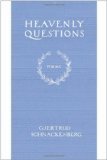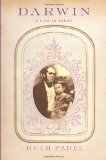Patrick Kanouse's Blog, page 58
January 20, 2011
Very Brief Reviews
Prior to my writing the upcoming NOOKcolor book (more details to come), I read several books of poems--some anticipated, some note. Here are my reviews of them...in brief:


Seamus Heaney's twelfth book of poems, Human Chain, is a step up from his last, District and Circle. I've long been an admirer of Heaney's early poems, up through The Haw Lantern. Not that Seeing Things and later books were not good, but they didn't, it seemed to me, measure up to the delights of North or Field Work.


If you haven't heard of Gjertrud Schnackenberg, pick up Supernatural Love: Poems 1976-1992, which collects her first three books of poems. Heavenly Questions is her latest, and it is quite good. Subtle, erudite, and philosophical.

Derek Walcott's White Egrets was quite disappointing. Like Heaney, I admire Walcott's early poems, but Walcott's work in recent years is limp and unexciting, and White Egrets does nothing to help that feeling.
 Glyn Maxwell's Hide Now was the most disappointing volume in this set of very brief reviews. Slack, without tension. I felt like I was reading a completely different Glyn Maxwell than I have in the past.
Glyn Maxwell's Hide Now was the most disappointing volume in this set of very brief reviews. Slack, without tension. I felt like I was reading a completely different Glyn Maxwell than I have in the past.

It would be too much to call Ruth Padel's Darwin: A Life in Poems experimental, for its poems are standard, if accomplished. If experimental at all it is that this book tackles a single subject (even if within that are many themes)--yet that cannot be called experimental either. The book is intriguing and my conflict between experimental and not speaks, I think, to its success.


Seamus Heaney's twelfth book of poems, Human Chain, is a step up from his last, District and Circle. I've long been an admirer of Heaney's early poems, up through The Haw Lantern. Not that Seeing Things and later books were not good, but they didn't, it seemed to me, measure up to the delights of North or Field Work.


If you haven't heard of Gjertrud Schnackenberg, pick up Supernatural Love: Poems 1976-1992, which collects her first three books of poems. Heavenly Questions is her latest, and it is quite good. Subtle, erudite, and philosophical.

Derek Walcott's White Egrets was quite disappointing. Like Heaney, I admire Walcott's early poems, but Walcott's work in recent years is limp and unexciting, and White Egrets does nothing to help that feeling.
 Glyn Maxwell's Hide Now was the most disappointing volume in this set of very brief reviews. Slack, without tension. I felt like I was reading a completely different Glyn Maxwell than I have in the past.
Glyn Maxwell's Hide Now was the most disappointing volume in this set of very brief reviews. Slack, without tension. I felt like I was reading a completely different Glyn Maxwell than I have in the past.
It would be too much to call Ruth Padel's Darwin: A Life in Poems experimental, for its poems are standard, if accomplished. If experimental at all it is that this book tackles a single subject (even if within that are many themes)--yet that cannot be called experimental either. The book is intriguing and my conflict between experimental and not speaks, I think, to its success.
Published on January 20, 2011 06:00
January 18, 2011
Patrick Kanouse's Poetry Pages: Facelift
I have begun learning to use Adobe's Dreamweaver product, so I decided to learn it by updating my website. So please visit and let me know what you think!
Published on January 18, 2011 06:00
January 12, 2011
Using NOOKcolor and NOOK, 2/E: Published!

So the ebook I was writing prior to Christmas is now out and available for sale at bn.com. In marketing speak: This book is for new to advanced users of the NOOKcolor and NOOK. I cover the basics of using the devices along with the NOOK apps on phones, Macs, and PCs. Rooting the NOOK is covered as well. When I published this, the rooting process for the NOOKcolor was not yet stable, so it is not covered, though I'm working on an article for that now.
I cover more and in greater depth anything the NOOKcolor or NOOK user guides cover. Please check it out!
Published on January 12, 2011 06:00
January 11, 2011
That Quote Is From....
So the Shakespearean insult: "I do desire we may be better strangers" is from As You Like It, Act III, Scene 2. Here is a larger context of that quote:
JAQUES. I thank you for your company; but, good faith, I had as
lief have been myself alone.
ORLANDO. And so had I; but yet, for fashion sake, I thank you too
for your society.
JAQUES. God buy you; let's meet as little as we can.
ORLANDO. I do desire we may be better strangers.
JAQUES. I pray you mar no more trees with writing love songs in
their barks.
ORLANDO. I pray you mar no more of my verses with reading them
ill-favouredly.
JAQUES. I thank you for your company; but, good faith, I had as
lief have been myself alone.
ORLANDO. And so had I; but yet, for fashion sake, I thank you too
for your society.
JAQUES. God buy you; let's meet as little as we can.
ORLANDO. I do desire we may be better strangers.
JAQUES. I pray you mar no more trees with writing love songs in
their barks.
ORLANDO. I pray you mar no more of my verses with reading them
ill-favouredly.
Published on January 11, 2011 06:00
January 6, 2011
Shakespeare Insult: #1
[image error]
Of the many awesome things I received for Christmas (the MacAir I'm using right now to write this), one item seemed particularly interesting...for I will be able to make many a blog post about it. My brother gave me a shirt featuring quotes from Shakespeare featuring insults.
So throughout this year, I'll feature a quote, give an opportunity to guess the play (including act, scene, and character), and then reveal the answer.
So...without further ado, here's the first quote:

So throughout this year, I'll feature a quote, give an opportunity to guess the play (including act, scene, and character), and then reveal the answer.
So...without further ado, here's the first quote:
"I do desire we may be better strangers"
Published on January 06, 2011 06:00
January 4, 2011
Rushing the Growler: Jared Carter's Blog
Just wanted to highlight a new blog that has recently come on line from Jared Carter: Rushing the Growler.
Published on January 04, 2011 06:00
December 30, 2010
Interview Online
If you are interested, you can read my interview on Goodreads at this link.
I appreciated the opportunity to participate.
I appreciated the opportunity to participate.
Published on December 30, 2010 07:46
December 24, 2010
A Christmas (Short) Essay
Christmas has long now been a thoroughly secularized holiday. True, many still respect and honor it's Christian themes, though mostly people have moved back beyond those to the Feast of the Unconquered Sun or Saturnalia. Christmas is a holiday wedded to materialism in the most obvious ways, but the materialism of the holiday does not, I think, account for its pervasive influence. Nor does it Christian or pagan roots account for it either.
Much of what we value in religion is ritual, sacrament, and idealism, and Christmas carries those forth in the secular realm. The Christian rituals of Christmas (midnight Mass, Christmas Eve services, etc.) continue to decline in attendance, but the rituals of Christmas as we celebrate it more and more expand: exterior lights, Christmas trees, certain movies, family traditions. These take center stage. These serve in the place of religious exercises for more and more people. Instead of attending Christmas Eve services, people wrap gifts on Christmas Eve. Instead of reading the Matthew nativity story, we watch A Christmas Story, Love Actually, or any number of holiday-themed movies. And we do this year after year. The routine, the tradition, the ritual of the activity has become a sacrament. And within this sacrament lies the idealism of a more perfect world.
Why do we wish for a white Christmas? Why do we expend so much effort on selecting gifts and preparing food? Often our wishes do not become reality (hence, idealistic), but we never stop trying to bring the idealism into reality (I consider this, frankly, on par with our sense of justice: we have an ideal and we strive time and again to achieve the ideal). I often think we wish so much for a white Christmas not so much because we think of the northerly latitudes and Christmas but because so little traffic is out on Christmas (or we expect there to be so much less) that the snow can remain pristine, un-grimed from road traffic--even if just for a few hours. Instead of a road sidelined by piles of blackening snow, we can see a white field, crisp and beautiful in a Christmas sun.
I cherish these rituals. I have my own set of expectations from which I derive much enjoyment. While many will lament the materialism of Christmas, I actually think that materialism is an idealistic attempt to capture a childhood ideal of Christmas that was left unmet (for ideals are, because they are perfect, never really met). My expectations are a combination of my childhood memories and what I found pleasant and new ones I've created with my wife, which fall into the realm of the sacred. They may be cheesy or odd or silly to some, but rituals are never about the others but are instead about our relation to the larger world.
Here is Robert Frost's poem "Christmas Tree":

Much of what we value in religion is ritual, sacrament, and idealism, and Christmas carries those forth in the secular realm. The Christian rituals of Christmas (midnight Mass, Christmas Eve services, etc.) continue to decline in attendance, but the rituals of Christmas as we celebrate it more and more expand: exterior lights, Christmas trees, certain movies, family traditions. These take center stage. These serve in the place of religious exercises for more and more people. Instead of attending Christmas Eve services, people wrap gifts on Christmas Eve. Instead of reading the Matthew nativity story, we watch A Christmas Story, Love Actually, or any number of holiday-themed movies. And we do this year after year. The routine, the tradition, the ritual of the activity has become a sacrament. And within this sacrament lies the idealism of a more perfect world.
Why do we wish for a white Christmas? Why do we expend so much effort on selecting gifts and preparing food? Often our wishes do not become reality (hence, idealistic), but we never stop trying to bring the idealism into reality (I consider this, frankly, on par with our sense of justice: we have an ideal and we strive time and again to achieve the ideal). I often think we wish so much for a white Christmas not so much because we think of the northerly latitudes and Christmas but because so little traffic is out on Christmas (or we expect there to be so much less) that the snow can remain pristine, un-grimed from road traffic--even if just for a few hours. Instead of a road sidelined by piles of blackening snow, we can see a white field, crisp and beautiful in a Christmas sun.
I cherish these rituals. I have my own set of expectations from which I derive much enjoyment. While many will lament the materialism of Christmas, I actually think that materialism is an idealistic attempt to capture a childhood ideal of Christmas that was left unmet (for ideals are, because they are perfect, never really met). My expectations are a combination of my childhood memories and what I found pleasant and new ones I've created with my wife, which fall into the realm of the sacred. They may be cheesy or odd or silly to some, but rituals are never about the others but are instead about our relation to the larger world.
Here is Robert Frost's poem "Christmas Tree":
The city had withdrawn into itself
And left at last the country to the country;
When between whirls of snow not come to lie
And whirls of foliage not yet laid, there drove
A stranger to our yard, who looked the city,
Yet did in country fashion in that there
He sat and waited till he drew us out
A-buttoning coats to ask him who he was.
He proved to be the city come again
To look for something it had left behind
And could not do without and keep its Christmas.
He asked if I would sell my Christmas trees;
My woods—the young fir balsams like a place
Where houses all are churches and have spires.
I hadn't thought of them as Christmas Trees.
I doubt if I was tempted for a moment
To sell them off their feet to go in cars
And leave the slope behind the house all bare,
Where the sun shines now no warmer than the moon.
I'd hate to have them know it if I was.
Yet more I'd hate to hold my trees except
As others hold theirs or refuse for them,
Beyond the time of profitable growth,
The trial by market everything must come to.
I dallied so much with the thought of selling.
Then whether from mistaken courtesy
And fear of seeming short of speech, or whether
From hope of hearing good of what was mine,
I said, "There aren't enough to be worth while."
"I could soon tell how many they would cut,
You let me look them over."
"You could look.
But don't expect I'm going to let you have them."
Pasture they spring in, some in clumps too close
That lop each other of boughs, but not a few
Quite solitary and having equal boughs
All round and round. The latter he nodded "Yes" to,
Or paused to say beneath some lovelier one,
With a buyer's moderation, "That would do."
I thought so too, but wasn't there to say so.
We climbed the pasture on the south, crossed over,
And came down on the north.
He said, "A thousand."
"A thousand Christmas trees!—at what apiece?"
He felt some need of softening that to me:
"A thousand trees would come to thirty dollars."
Then I was certain I had never meant
To let him have them. Never show surprise!
But thirty dollars seemed so small beside
The extent of pasture I should strip, three cents
(For that was all they figured out apiece),
Three cents so small beside the dollar friends
I should be writing to within the hour
Would pay in cities for good trees like those,
Regular vestry-trees whole Sunday Schools
Could hang enough on to pick off enough.
A thousand Christmas trees I didn't know I had!
Worth three cents more to give away than sell,
As may be shown by a simple calculation.
Too bad I couldn't lay one in a letter.
I can't help wishing I could send you one,
In wishing you herewith a Merry Christmas.
Published on December 24, 2010 20:31
December 23, 2010
Interview and Chat
Wanted to pass the word along that I will have the pleasure of an interview and chat on Goodreads on the World Literature group's forum. There will be two sessions:
December 29, 2010 05:00PMDecember 30, 2010 09:00AMI hope you will be able to join!
December 29, 2010 05:00PMDecember 30, 2010 09:00AMI hope you will be able to join!
Published on December 23, 2010 12:57
December 16, 2010
Radio Open Source
I have recently been listening to the podcasts from Radio Open Source. Really quite good listening, but I wanted to highlight the Whose Words These Are series, where the host, Christopher Lydon, talks poetry (so far 30 episodes) with poets and critics: Henri Cole, Harold Bloom on Hart Crane, Joan Houlihan, and other.
Published on December 16, 2010 06:00



